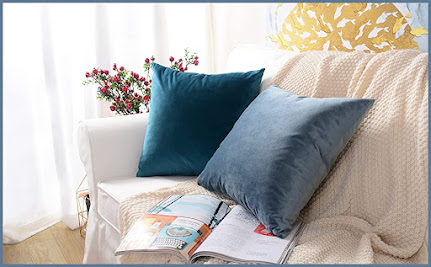Expert Tips for Mastering the Art of Mixing and Matching Pillows
Introduction: Throw pillows are a fantastic way to add elegance and personality
to your living room, family room, or bedroom. Rather than limiting yourself to
a few solid-colored pillows or the set that came with your couch, why not
explore the world of diverse and affordable options available? Mixing and
matching pillows can give your space a professional and sophisticated look,
even if they don't share the same color, pattern, or design. In this
comprehensive guide, we will provide you with expert tips on how to mix and
match patterns and colors to effortlessly refresh your space while maintaining
a coordinated yet unique aesthetic.
Choose Three Colors: To begin, select
a "color narrative" that will guide your pillow choices. Pick three
distinct colors from various elements in your space, such as the wall color,
rug, bedding, or curtains. Even if you opt for pillows with diverse designs,
maintaining a consistent color palette will ensure a cohesive effect. Explore
our "Shop by Color" section to find the perfect hues that align with
your color narrative.
Choose Three Patterns: Mixing and
matching different patterns is another approach you can take, as long as each
pattern includes at least one of the colors from your color narrative. Start
with your "lead" pattern, which should be the largest and incorporate
all three colors. The secondary patterns you choose can then feature one or two
of the colors. This approach is more challenging when working backward from
pillows you already own, so starting fresh may be easier.
Choose Three Pattern Sizes: When
applying the Rule of Three, it's important to consider the scale of your
patterns to avoid competition. Select designs in three distinct sizes, allowing
one of them to take center stage. The largest design should be your lead
pattern, followed by a medium-sized print, such as a stripe or small
houndstooth. The third pattern should be the smallest, like a solid color with
an interesting texture, a dotted swiss, or a damask stripe with a light
tone-on-tone pattern.
Break the Rules if You Want: While the
guidelines provided here offer a great starting point, it's important to
remember that all rules in design are meant to be broken. Feel free to
experiment and deviate from the recommendations if you find that you prefer
four colors or two large patterns instead of one. Ultimately, the most
important thing is that you enjoy the visual result. Use the Rule of Three as
inspiration, but don't hesitate to explore different combinations until you
find the perfect mix for your space.
Additional Tips: Once you've mastered
the Rule of Threes, consider these additional ideas used by room designers:
1.
Odd numbers appear modern: When
arranging your throw pillows, odd numbers, such as three or five, tend to
create a more artful and modern aesthetic. For most design tastes, odd numbers
are visually appealing. Additionally, a smaller number of larger cushions tends
to look fresher than a clutter of smaller ones.
2.
Even numbers appear
traditional: On the other hand, an even number of similar pillows, like two or
four, creates a balanced and symmetrical look, which is often preferred for a
traditional aesthetic, especially on beds or sofas.
3.
Texture matters too: While
pattern and color mixing are important, don't overlook the significance of
texture. Experiment with contrasting textures like smooth and rough, soft and
fuzzy. Consider incorporating faux fur, velvet, linen, knit wools, or tasselled
embellishments. Let your creativity shine by playing with different tactile
sensations while keeping your color and pattern theme in mind.
Conclusion: By following these expert tips, you can confidently mix and match pillows to elevate the visual appeal of your space. Whether you choose to focus on colors, patterns, or textures, remember to keep a cohesive thread running through your selections.
Read More: A Comprehensive Guide to Choosing the Perfect Throw Pillows For Your Couch



Comments
Post a Comment